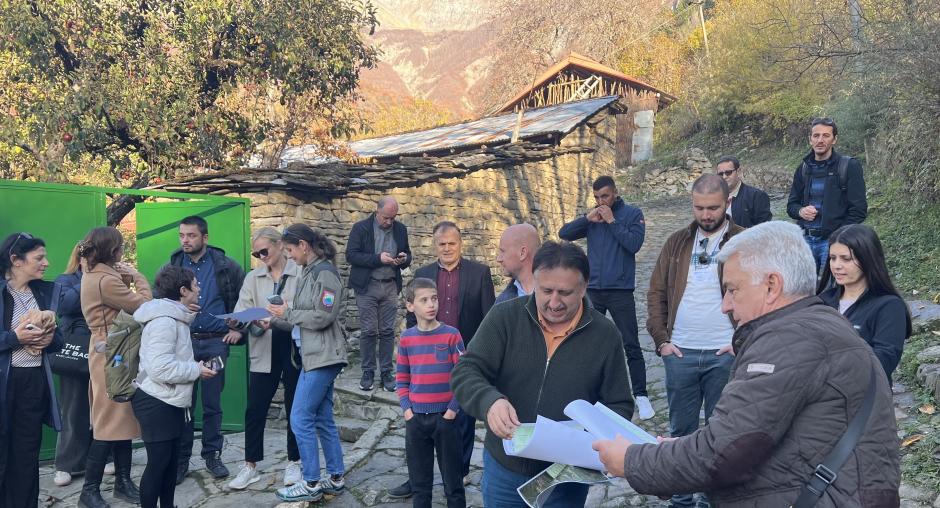Collaborative approaches to addressing illegal logging and strengthening climate resilience in the Shar/Šara Mountains and Korab Massif Area in focus at OSCE event

On 6 and 7 November 2024, more than 50 regional stakeholders gathered in Peshkopi to discuss joint approaches to reducing illegal logging in the four protected areas of Korab-Koritnik, Mavrovo, Shar Mountain and Sharri/Šara. The meeting was organized by the Office of the Co-ordinator of OSCE Economic and Environmental Activities (OCEEA), in co-operation with the OSCE Presence in Albania and the think tank adelphi.
In 2021, the OSCE-adelphi report “Regional Assessment for South-Eastern Europe” identified the Shar/Šara Mountains and Korab Massif area as a climate-security hotspot in South-Eastern Europe and a priority for regional co-operation. Further stakeholder consultations conducted in 2022 and 2023 highlighted forest governance as an entry-point for joint action to address climate-related security risks throughout the protected area and to strengthen the region's climate resilience.
“Illegal logging threatens the natural wealth of the region’s ecosystems, contributing to deforestation, soil erosion, and biodiversity loss, while undermining local livelihoods,” said Ambassador Michel Tarran, Head of the OSCE Presence in Albania, in his opening remarks. “The OSCE is committed to preserving these resources through supporting sustainable practices that build climate resilience and community well-being.”
The opening session also benefitted from welcoming remarks of Mr. Nexhbedin Shehu, Prefect of the county Dibra, who highlighted the important work of the OSCE in this area and welcomed future initiatives.
Senior Advisor at adelphi, Beatrice Mosello, noted the need for collaboration in light of both the environmental and socioeconomic interconnectedness of the geographical area.
“Climate change increasingly threatens the forests of the Shar/Šara Mountains and Korab Massif area by altering temperature and rainfall patterns, leading to habitat loss and increased landscape and wildfire risks, thus further intensifying the impacts of deforestation. Given the interconnectedness of the area from an environmental and socio-economic perspective, the associated security risks are shared among the four protected areas,” said Mosello.
The workshop provided an opportunity to present, discuss and validate findings from an ongoing study to assess the baseline of illegal logging in Shar/Šara Mountains and Korab Massif Area, assess the security implications for populations and ecosystems, analyze legal gaps, and provide targeted recommendations for regional stakeholders. During the workshop, examples of international initiatives to tackle environmental crimes were provided from the United Nations Office on Drugs and Crime and the United Nations Interregional Crime and Justice Research Institute.
"By bringing together representatives of park management authorities and municipalities of the protected areas, enforcement agencies, NGOs and international experts, and hearing from them about challenges and opportunities for co-operation in the area of climate change and forest governance, the OSCE and its partners are ensuring inclusive approaches within this pilot initiative. Through interactive discussions at the workshop, we have identified key areas for joint action and co-operation among stakeholders, which will provide a basis for future joint activities," said Ellen Baltzar Mossop, Climate Affairs Adviser at OCEEA.
The workshop concluded with a visit to the village of Rabdishta, where participants could witness first-hand the work of park rangers in relation to sustainable forest management and the prevention of illegal logging.
This workshop was organized within the framework of the OSCE extra-budgetary project “Strengthening responses to security risks from climate change in South-Eastern Europe, Eastern Europe, the South Caucasus, and Central Asia”, which is implemented by OCEEA in partnership with adelphi and in close collaboration with the OSCE field operations. The project is funded by Andorra, Austria, Czech Republic, Finland, France, Germany, Italy, Japan, Liechtenstein, Luxembourg, Norway, Poland, Slovenia, Sweden, Switzerland, United Kingdom and United States.
